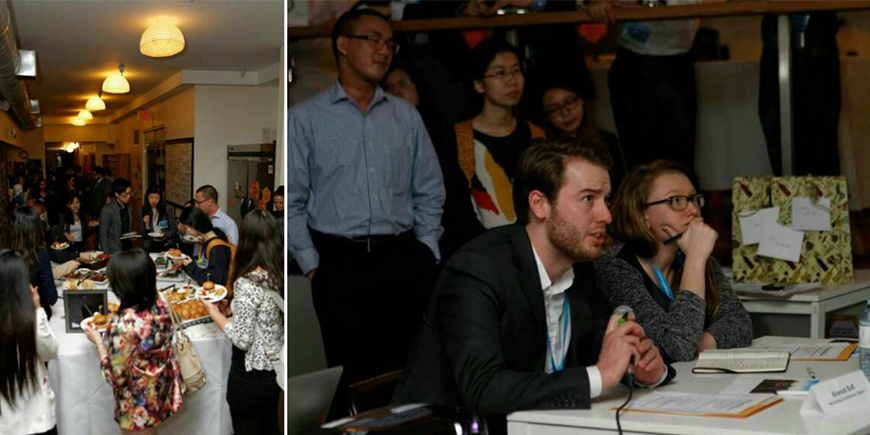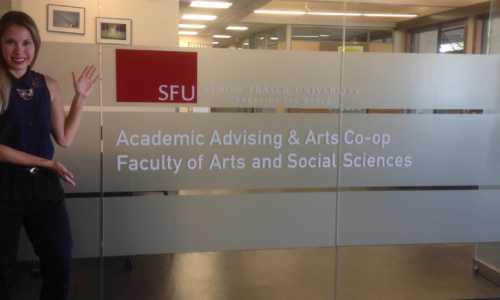
“Tell us about your work experience?”
This is a normal question during interviews. However, when you have no work experience, this question can lead to many embarrassing moments. And, like many students, I faced this situation frequently during my second and the third year of university.
As an SFU student, I knew that one way to get rid of the zero-work-experience situation was to apply for co-op. With the help of a co-op advisor, it would be much easier to prepare resumes, ace job interviews, and gain work experience. However, being an international student who does not have good language skills, I dared not apply for co-op jobs and compete with local students. What if I sent out sixty resumes and did not get one interview?
To make matters worse, when I asked other international students who had applied to co-op jobs before about how hard it was, they would put on a stern face and tell me that I would have to be very competitive and have a very high GPA to just get an interview.
Alright, I thought, if that is the case, what about looking for a job by myself? I looked for positions as a cashier or waitress, but I soon found that most employers preferred workers who were able to work at least six months. Besides that, the study permit only allowed me to work for 20 hours at maximum, which limited the types of jobs I can find.
Occasionally, I would hear one of my international friends talking about having a work-study job. I was told that it was not as hard to find a work-study job as it was to find a co-op placement and that the periods of enrollment were only for 4 months. I did some research and decided to try.

With my friend’s help, I submitted my application at gosfu.ca and got the approval to apply to jobs in the pool. Just like applying for a job somewhere else, I needed to send my resume and pass the interviews. After failing several times, I finally got a Research Assistant position. This was my first Canadian job related to what I was learning in school! I was very excited. During that semester, I worked as a transcriber for a professor transcribing documents in English and Mandarin. It was challenging in the beginning — the work was very detail-oriented and I was asked to set my own schedule but because of the challenges, I was urged to work hard and to make plans. And as the term went on I delightedly found that I became more careful in my work and had better time-management skills.
Having a taste of a “real job”, an idea came to my mind: “I should try to apply for co-op”. At that time, I was still not very confident in my language skills, so I thought about getting an international co-op job in China. During my seeking semester, my advisor sent an email about a marketing intern position with a French company in Beijing. I was very interested in working in marketing and learning French, so I edited my resume and applied for the job.
I was offered a bilingual (English and Mandarin) phone interview. I was not as stressed as I expected this time, partly because I had gained some interview experience when applying to work-study jobs. And, soon after the interview, I got the job offer.
The first few days back in China were not fun, honestly. Before I departed from Canada, I did not anticipate that I would experience cultural barriers, after all, China is my home country and I had lived there for 20 years before I came to Canada. Why would there be any issues?
But right after I arrived in China, I started to realize that I was completely wrong. I felt more like a foreigner than a native. I was not used to seeing so many people; I was not used to the spicy northern Chinese food; I was not used to the e-transfer, which, is used to make payments in most shops. It seemed that I had grown and changed a lot in the few years I was in Canada, and so had the Chinese society, but in completely different ways.
Despite the great cultural shock, my co-op job was still pretty enjoyable for me. My supervisor was an SFU alumnus. He guided me through the process of conducting research and gave me many useful suggestions on how to write reports. Besides that, my co-workers were all very friendly to me, and we established good relationships with each other. This co-op experience deepened my understanding of marketing and the business world.
After completing work-study and co-op, even now, finding a formal job in Canada is still not easy for me. However, I now have a better understanding of the kind of jobs I like, and my chances of getting an interview are much higher than before. And as I gain more experience, I am no longer worried about being rejected or not able to fit into the office culture.
Here I have some advice for international students, who are struggling to find their first job in Canada.
1. Apply for Work-Study Positions
Work-study is a program that helps students with their financial situations, and it is a part of the bursary system. In that program, most of the jobs are office jobs, often research-based, and no longer than one semester. Since international students often have more financial burden and less work experience than local students, this program can benefit you even more.
2. Networks and Friendships are Important. Friends can Help You a lot in Collecting Information and Finding Jobs
I cannot imagine how I would have gotten my first work-study job if I had not overheard my friend’s conversation about the program. International students are usually far away from their families. Making friends can help you build a network, collect information and find more job opportunities.
3. Don’t be Intimidated by Others’ Experience; Everyone is Different
What would have happened if I had not got scared after hearing about other students’ co-op experiences? I wonder from time to time. I don’t think I can ever answer that question, but I feel that I might have gained more experience if I had more courage to try. Everyone is different, and you can never predict how much effort it will take until you start.
Beyond the Blog
-
Interested in learning more about finding work on campus? Visit the Work-Study Program homepage.
-
For more tips on job search success for international students, go here.
-
Need help with interviews or resumes? Check out our Interview Question Database and Resume Gallery.














